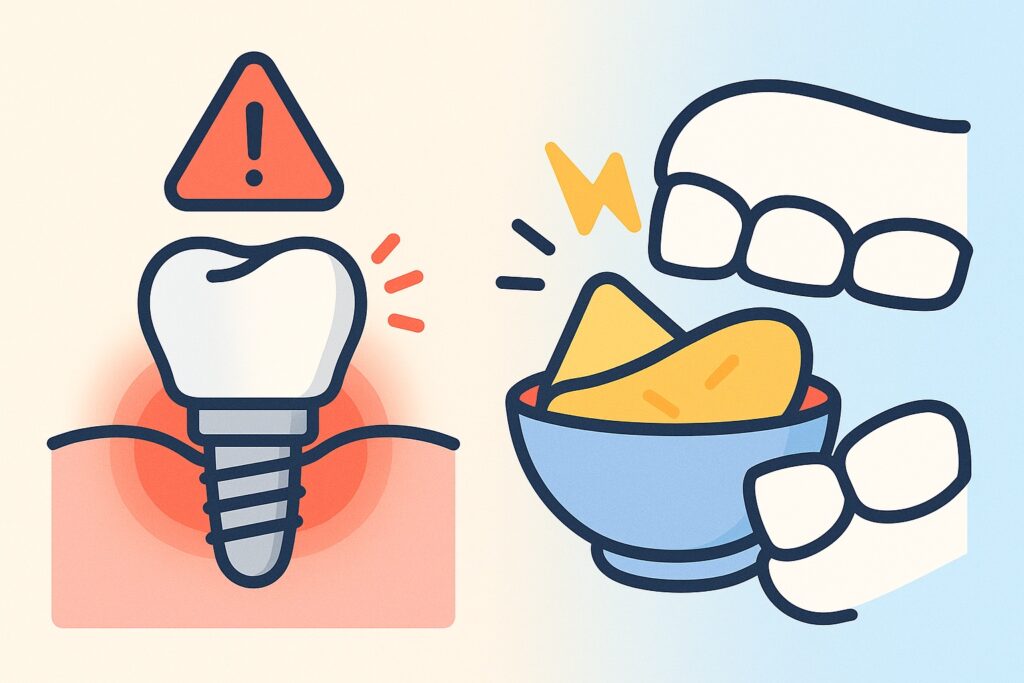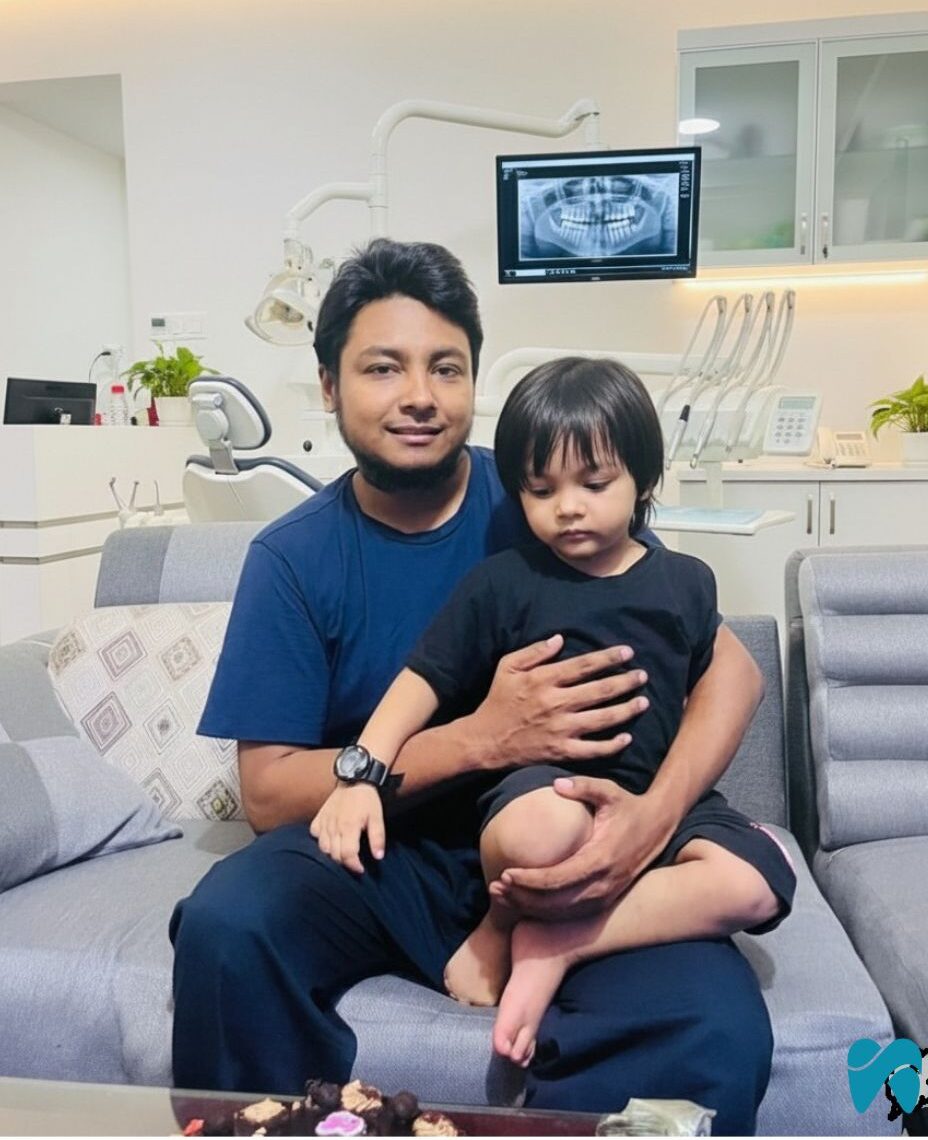Pain while chewing with a dental implant can be alarming, especially if the implant was placed months ago and seemed to heal well. Many patients expect implants to feel just like natural teeth, so when discomfort arises, it raises immediate concerns. While some mild soreness is normal during the initial healing period, any sharp, prolonged, or worsening pain while chewing is not. Understanding the difference between normal healing sensations and signs of a potential problem is essential for protecting your oral health and ensuring the long-term success of your implant.
What’s Considered Normal After a Dental Implant
In the days and weeks following dental implant surgery, some degree of discomfort is expected. This is part of the natural healing process as your jawbone integrates with the implant in a process called osseointegration. Here’s what’s typically considered normal:
- Mild Pain or Discomfort: It’s common to feel some soreness for up to a week after the procedure. This discomfort is usually managed with over-the-counter pain medications.
- Swelling and Bruising: These symptoms may appear around the gums or face and usually subside within a few days to a week.
- Tenderness While Chewing: As the tissues heal, gentle pressure on the implant site may feel sensitive, especially if a temporary crown is placed during the healing phase.
- Gradual Improvement: Pain should steadily decrease over time. If you’re healing normally, chewing will become easier and more comfortable over several weeks.
Typically, full healing can take 3 to 6 months, during which your dentist may monitor the implant’s stability. Any pain experienced during this period should be mild, intermittent, and improving. If it persists or worsens, it may indicate a complication.
Causes of Pain While Chewing After the Healing Period
Once the healing phase is complete, dental implants should not cause pain during normal use. If you begin to feel discomfort while chewing—weeks or even months later—it’s often a sign of an underlying issue. Common causes include:
Poor Osseointegration
If the implant did not properly fuse with the jawbone, it may remain slightly mobile. This can lead to pain when chewing, especially under pressure. Failed osseointegration often requires removal and re-evaluation of the site.
Infection or Peri-implantitis
This is an inflammatory condition affecting the gum and bone around the implant, similar to gum disease. It can cause swelling, bleeding, and tenderness when chewing. Left untreated, it may lead to implant failure.
Implant Overload or Bite Misalignment
If the implant is taking on more biting force than it should—due to poor positioning or bite misalignment—it can strain the bone and surrounding structures. This often results in sharp pain or discomfort during meals.
Gum Recession or Nerve Irritation
Receding gums may expose parts of the implant or abutment, causing sensitivity or pain. In some cases, if a nerve near the implant is irritated or compressed, it can cause ongoing discomfort, especially when pressure is applied during chewing.
Sinus Issues (For Upper Implants)
For implants placed in the upper jaw, especially near the sinus cavity, sinus inflammation or perforation can cause referred pain or pressure when chewing. This may feel like implant pain but is actually sinus-related.
Loose Crown or Abutment
If the crown or abutment becomes loose, it can shift slightly during chewing. This movement causes pain in the surrounding tissues and may put stress on the implant itself. A quick adjustment or tightening is often all that’s needed.
Signs You Shouldn’t Ignore
While some discomfort is normal during the early healing stages, pain that develops or persists after the implant has fully healed should never be dismissed. Here are key warning signs that suggest something may be wrong:
Persistent or Increasing Pain
Pain that continues for weeks or gets worse over time—especially during chewing—is not typical. This could indicate infection, implant instability, or mechanical issues like a misaligned bite.
Swelling, Redness, or Pus
Visible inflammation around the implant site, particularly if it’s accompanied by pus or a bad taste, strongly suggests infection such as peri-implantitis. This condition can progress quickly and compromise the implant if left untreated.
Pain Months or Years After Placement
Delayed pain is especially concerning. If an implant starts hurting long after successful healing, it may point to bone loss, gum disease, or stress-related complications like bruxism (teeth grinding).
Difficulty Chewing on One Side
If you’re avoiding chewing on the side with the implant due to pain or sensitivity, this suggests the implant isn’t distributing bite forces correctly—or it may be inflamed or loose.
When to See Your Dentist
If you’re experiencing pain while chewing on a dental implant—especially after the healing period—it’s important to see your dentist as soon as possible. Prompt evaluation can prevent minor issues from turning into serious complications.
When to Book an Appointment
- Pain that lasts more than a few days or is getting worse
- Swelling, bleeding, or signs of infection around the implant
- Pain when applying pressure during chewing
- Clicking or shifting sensations from the implant site
Delaying care can lead to further bone loss or implant failure, so don’t wait for symptoms to improve on their own.
What Your Dentist Will Do
- Visual and Physical Examination: They’ll assess gum health, check for movement, and test bite alignment.
- X-Rays or CT Scans: These help identify bone loss, implant positioning, or signs of infection not visible to the naked eye.
- Probing Around the Implant: To check gum depth and inflammation levels (similar to periodontal checks).
Treatment Options Based on the Cause
The right treatment for dental implant pain while chewing depends on the root cause. Once your dentist has identified the issue, here are the most common approaches:
Bite Adjustment or Crown Replacement
If the implant is bearing too much force when you chew, a minor adjustment to the crown or surrounding teeth may resolve the problem. In some cases, a poorly fitting crown may need to be replaced entirely to balance the bite properly.
Deep Cleaning or Antibiotics for Infection
When infection is present, especially in early-stage peri-implantitis, your dentist may perform a deep cleaning around the implant using specialized tools. Antibiotics—oral or topical—can help manage the infection and reduce inflammation.
Implant Maintenance or Retightening
A loose crown or abutment can often be tightened or recemented during a single visit. If parts are worn or damaged, replacements may be needed.
Bone Grafting or Surgical Revision
In more serious cases where there’s significant bone loss or failed osseointegration, your dentist may recommend removing the implant, performing a bone graft, and later placing a new implant after healing.
Management of Nerve or Sinus Complications
If nerve involvement or sinus issues are the source of discomfort, treatment may include anti-inflammatory medication, referral to a specialist, or corrective surgical procedures, depending on the severity.
How to Prevent Implant Pain in the Future
Preventing pain and complications after a dental implant involves consistent care, monitoring, and awareness. Here’s how you can protect your implant long-term:
Maintain Excellent Oral Hygiene
Brush twice a day using a soft-bristled toothbrush and non-abrasive toothpaste. Floss daily, including around the implant area, to prevent plaque buildup and gum inflammation.
Use Interdental Brushes or Water Flossers
These tools help clean areas around the implant that regular brushing might miss, especially where gum tissue is tight or recessed.
Visit Your Dentist Regularly
Schedule routine dental checkups at least twice a year. Your dentist can monitor the health of the implant, gums, and surrounding bone, and catch early signs of trouble.
Watch for Early Signs of Problems
Report any discomfort, changes in bite, bleeding, or swelling to your dentist immediately—even if symptoms seem minor.
Avoid Excessive Force on the Implant
Don’t use your implant (or any teeth) to open packages or bite hard objects. If you grind your teeth at night (bruxism), ask your dentist about a night guard to protect the implant from stress and wear.
Stick to Post-Op Instructions
After implant placement, follow all recovery guidelines closely. This includes dietary restrictions, medication, and avoiding physical strain on the area during healing.
Conclusion
Pain while chewing on a dental implant is not something to ignore, especially if the implant has already healed. While some sensitivity is expected shortly after placement, ongoing or sharp discomfort typically signals a deeper issue—such as infection, bite imbalance, or implant instability. Early intervention is key. A timely visit to your dentist can mean the difference between a simple adjustment and a more complex treatment. With proper care, regular checkups, and attention to any unusual symptoms, dental implants can remain stable, functional, and pain-free for many years.

